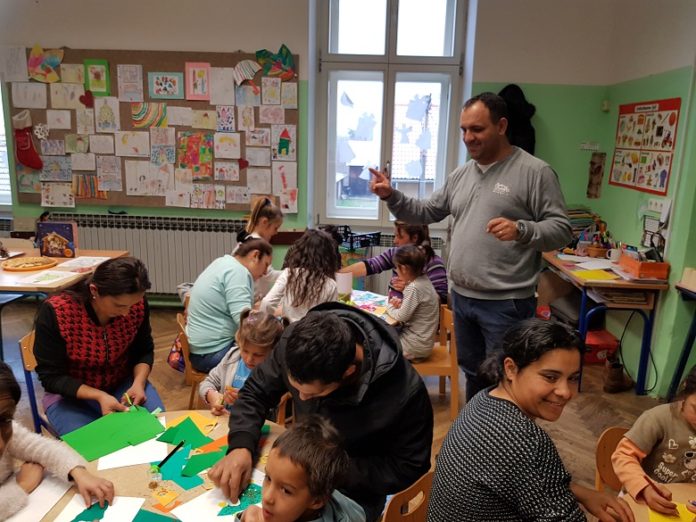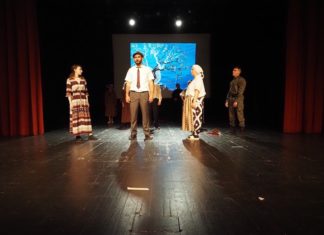As an assistant in teaching, I began to work in the school year 2002/2003. I never thought I would be doing that. At one time I wanted to be a driver or after graduating high school I was thinking about the admission at the Faculty of Teacher Education, being my parents’ wish. When the school principal contacted me looking for a Rromani teaching assistant, I had already been working as a driver and receiving a salary less than the minimum. The school principal knew me well, her husband was my teacher and so she trusted me with this job. I was not sure what to do and whether I could do it, but I thought it was worth trying one school year, and the pay was higher than the one I earned at that moment. That’s how I started, and I work in that school today.
Support in Academic and Social Education
Rromani children did not have the habit of compulsory school attendance at all, so beginnings were very difficult. We had to knock from door to door, beg parents to prepare children for classes, and we walked from the village on foot, under various weather conditions, to school. In addition, children did not know the language and did not have school supplies, which made learning more difficult, and these problems still exist. Although textbooks for Rromani children are provided, parents should provide notebooks and accessories, but they often do not, because they still do not consider it important for their child’s progress. Sometimes I would, just like other teaching assistants, help and buy a pencil, crayons or some other item for a child, but I am not sure how good it is, because the parents quickly get used to the fact that their obligation will be taken over by someone else in the future as well. When the teaching assistant for Rromani children position was being introduced, at first it was not recognized as exceptionally significant, but only as a measure to establish a better communication between the teacher and the child, as an aid to understanding the subjects, and to help achieve some sort of better assessment. Over time, however, it turned out that a teaching assistant for Rromani children is indispensable and must be a true professional in their work. Rromani children live in settlements and places largely isolated from the rest of the world, and when they first come to school, they find themselves literally in a completely new environment and they do not see their mother for a few hours. They need to be able to rely on someone, and this must be the person who understands their language and the environment and this is exactly what Rromani teaching assistant does. Talking to their teaching assistants, children started speaking the Croatian language more accurately and expressing themselves properly. My job has become part of my biorhythm. Every year the same thing happens. At the beginning of the school year I have a slight nervousness because I do not know what kind of problems I will encounter. Nevertheless, seventeen years of experience have had their way and I have gained confidence that makes it easy for me to work and make quick contact with every child. Often when I think I ask myself same questions – am I, being a teaching assistant, entirely part of a collective striving to make children really achieve good results and how much my work means for the community?
In the Međimurje County where I work, teaching assistants work with children from the preschool until the fourth grade of elementary school, but they remain in contact with those children throughout their schooling. I stay after school with my 7th and 8th grade pupils and we talk. They have their dreams and desires, and some of them they cannot achieve with better grades. Since I know them very well, I can properly assess the capacities of each of them and direct them in their further education. For example, some of them dream of becoming a pilot, while their grades, knowledge and abilities show that they would be better off in some other activity. I advise them to be realistic and to consider what they are good at, what will enable them to work and earn successfully after school.

I have experienced all sorts of situations and anecdotes during many years of work, and I will share one with you now. I worked as a teaching assistant in the 3rd grade of elementary school. The teacher was in class, as usual, and tried to quite the children that were particularly troubled, loud and deconcentrated that day. I did not interfere because my role was not to correct one’s behaviour and in that way interfere with teacher’s business. However, when after hours of hard work a homeroom hour arrived, I asked the homeroom teacher to allow me to take that hour over because I wanted to tell them a story, to fourteen Rromani children. I started speaking in the Bayash language and the children suddenly calmed down, you could hear a pin drop and there was splendour in their eyes. For the first time they had a chance to hear something in their own language in school. The teacher also noticed it, and when that hour ended, she said she had been teaching in that school for twenty-five years and had never managed to draw children’s attention in a way I did in one school hour. The children certainly listened and enjoyed themselves. I used this experience often in a preschool too. I translated some fairy tales, such as Little Red Riding Hood and Cinderella, into the Bayash language and told them these stories adding some movements, changing the intonation and acting a bit, and the children would be happy and listened attentively. Even some parents said that they later heard these fairy tales from their children for the first time.
Legitimate Segregation?
Among the Rromani children and young people there are many talented, studious and hard-working individuals. These are decent children, willing to learn who achieve excellent results, for example in the knowledge of foreign languages or master crafts. Such a young person establishes their position both in the Rromani and majority community, but the media does not cover such positive stories. Outstanding results achieved by the Rroma are not recognized and not presented, while at the same time a great deal of attention has been paid to negative events. It is by no means good for the establishment of mutual trust and people do not even know that after the initial feeling of discomfort and fear at the encounter with the Rroma, they would be pleasantly surprised because we are peaceful and hospitable people.
I would like to address here another situation in Međimurje, and that is the separation of children in schools. Croatian children living in areas constituting the Rromani settlements do not want to go to school in their community because they would have to be together with the Rromani children and they go to other nearby elementary schools in the county. For example, there are 1330 Croats living in the village Kuršanec, and 1660 Rroma living in the Kuršanec settlement. They should go to school together, but because of this situation we cannot have mixed nationality classes. This leads to legitimate segregation that prevents the integration of Rromani children and a mixed community that would develop a normal coexistence. Croatian children can be admitted to other schools, but when a Rroma comes to that same school then they say the admission is closed. People just do not understand that running away will not solve anything and that their behaviour prevents the development of interpersonal relations at the very first steps the child makes in society, which is education.
An additional problem for Rromani children is the concept of their parents, which is still largely present, that they do not need education. As a reason, unfortunately, they cite the examples that they encounter on a daily basis. For example, some professions, such as baker or butcher or other occupations that require food contact, are completely unavailable to the Rroma because no one wants to hire them. It has also happened that people would not let a Rromani nurse to take their blood. Of course, parents think that going to school for their children is just a waste of time. Practice in such cases is also inadequate as it comes down to threats, fears, and reports to the Social Welfare Centre and other competent institutions, rather than to work continuously on parent education teaching them how to participate in their child’s life. To advise them to show interest, to ask their children what they have learned, to check the timetable, to look at the notebook, to ask them if they did their job, read the book, and the like. Only those Rromani children, whose teachers can directly guarantee that they will return the book, can borrow one from the library, and the children learn a lot from reading. So I read them a lot, and many books have enriched my life as well. One of those worth mentioning is The Postman’s Tale, which is still the unforgettable required reading both to my pupils and to me from the beginning of schooling as a story for children from which adults can learn a lot.












